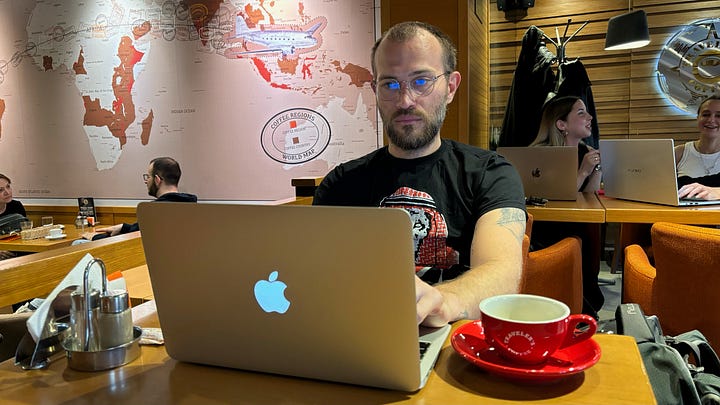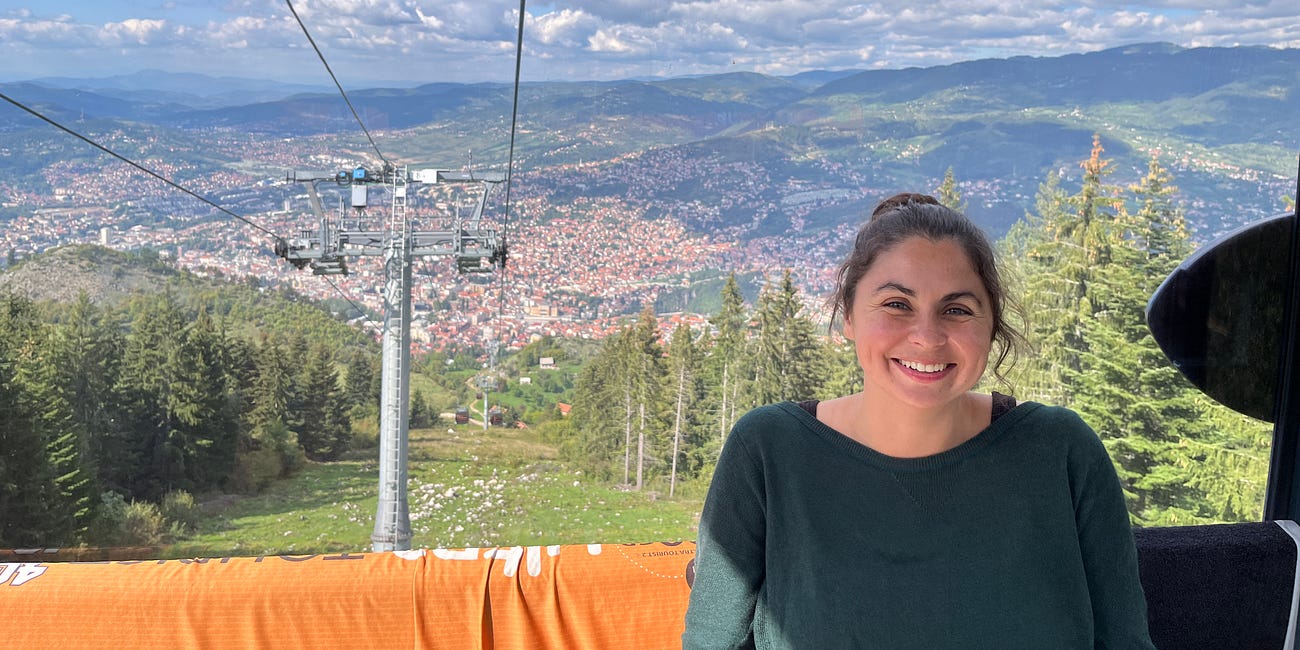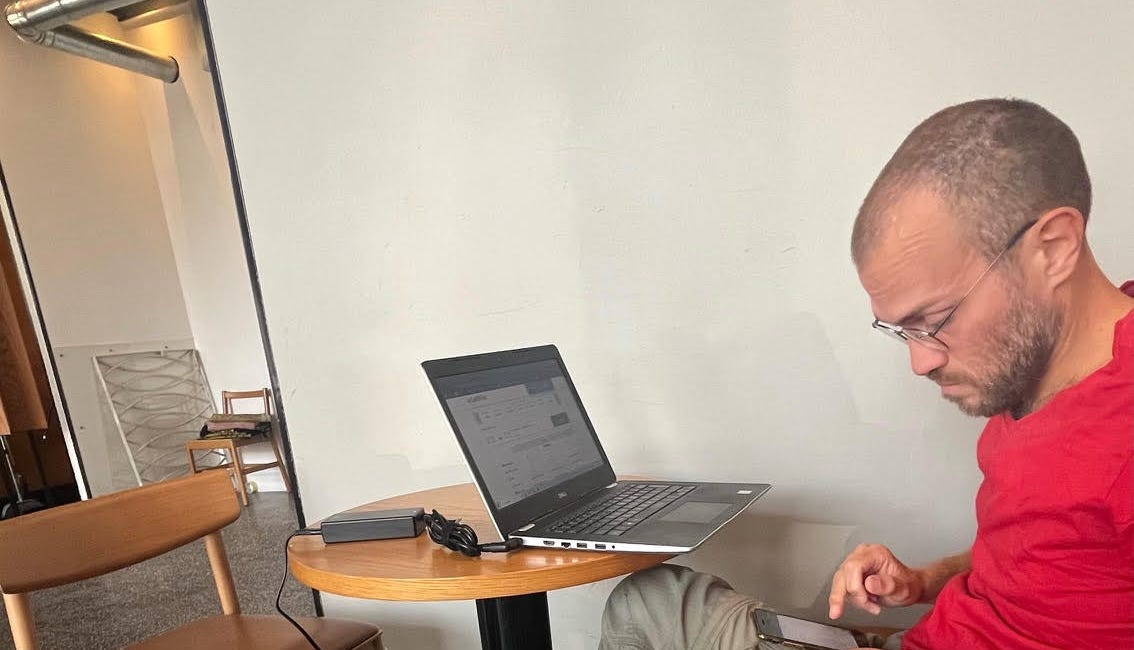(Not) Working remotely on the Trans-Siberian Railway
We climbed up and down the stairs hunting for Wi-Fi, much like Mateus did on Ilha do Cardoso, writes Wesley Faraó Klimpel
I'm delighted to publish the fourth piece in the "Working Remotely Throughout the World" series, the third by my former newspaper colleague, Wesley Faraó Klimpel, from “Sem Chaves” (Without Keys). In today's edition, he shares his experience of not working on the Trans-Siberian Railway. Would you like to be part of this series? Let me know in the comments or by replying to this email.
Traveling on the Trans-Siberian/Trans-Mongolian railway had been a dream of mine since 2007, ever since I read about the journey in a magazine —remember when print media instead of social networks influenced us?
First, it's important to clarify the different train routes. The Trans-Siberian crosses Russia from one end to the other, from Moscow to Vladivostok—fans of the board game Risk (War in Brazil), another relic, will smile at that name. However, these tracks have two branches leading to neighboring countries: the one that goes directly to China's capital is the Trans-Manchurian, while the Trans-Mongolian reaches the same destination but passes through Mongolia first.
My wife, Pati, and I wanted to visit all three nations this way, but life doesn't always align with our wishes. Our Chinese visa didn't arrive in time while we were preparing to launch our book in Brazil. And with limited information about Russia —the train company's website isn't accessible from abroad— we weren't even sure if traveling to Mongolia by rail was possible.
When we landed in Moscow in April, we discovered that the train was running outside of Russia. We also learned a few things about the economic sanctions imposed due to the war in Ukraine: foreign bank cards hadn't been accepted for months, and many social networks were restricted.
As for money, we estimated our expenses, withdrew a substantial amount of euros in Europe before entering Russia, and then exchanged them for rubles. To solve the internet issue, after much research, we discovered AntiZapret, a free VPN that allowed us to access the digital world without censorship.
To travel the Trans-Siberian, a train connects Moscow and Vladivostok in one go, a seven-day journey. But you need to be prepared to stay on the train for that long, with only a few hour-long stops along the way. It's more common to break up the trip and spend a few days in cities like Yekaterinburg and Irkutsk, which is the choice we wisely made.
Second-class cabins offer some comfort, with USB ports next to the four beds—two bunks—and a table by the window. However, the lower berths are more expensive and in demand, and since we had many upper berths, we didn't feel comfortable sitting on other passengers' beds. So, we spent many hours lying down. And if we didn't keep our laptops charged, they were useless during the trip.
Even though there were Wi-Fi signs in many carriages, we never managed to connect. We did have a Russian SIM card from Megafon, but it only worked in urban areas, and since we traveled through the Siberian countryside, you can imagine how often we passed through a city. Our hours on the tracks were offline, filled with crossword puzzles, reading, and jotting down notes on the laptop.
At least our days in the cities were productive. We only had issues with hotels and Airbnb in Ulan-Ude, our last stop before crossing the border into Mongolia. We would have had to pay extra to stay in a room near the reception and the modem for better connectivity. With limited cash, we climbed up and down the stairs hunting for Wi-Fi, much like Mateus did on Ilha do Cardoso.
Regardless, we reached our fictional license at the universal office of the digital nomad: a good coffee shop. We found some chains that operate in varied cities. As soon as we saw names like Skuratov, Traveler's Coffee, and Simple Coffee, we knew we'd have fast internet (often requiring a local SIM for registration), comfort for hours, and excellent drinks.


Russia has a rich culture and history, and this was our third visit. I love the country so much that I learned the language back in 2012, but I know this isn't the best time for newcomers. The challenge of traveling with cash and trying to decipher Cyrillic, along with the political issues, might hinder your experience there.
Read the full series:
Working remotely in the Balkans as a solo traveler
I am very excited to publish the third post of the series about remote work around the world. This edition's guest is Ashleigh Bugg from Travel Bugg, a Substack that helps you travel with tips, guidelines, and recommendations from places she has been.
Starbucks, fast internet, and amazing sofas: working remotely in the Middle East
Last May, I invited journalist Wesley Faraó Klimpel, who is traveling the world on his project “Sem Chaves” (Without Keys), to write about the experience of working remotely from Africa. The partnership was so great that we repeated it in the Middle East, where he and his wife, Pati, recently spent two months. The plan is to create a series about remot…
It's not that easy to be a digital nomad in West Africa
First, I apologize for the delay in mailing this Friday's newsletter. This was an unusual week for me.








This is such an interesting series! I love reading experiences of people working (or trying to lol) in the most remote places. Also, the Trans-Siberian railway has always been a dream of mine, and I had no idea that there were tracks passing through neighboring countries! So interesting!!
I first heard about the Trans-Siberian reading a Paul Theroux book. These are useful tips for anyone looking to visit Russia! A great series.